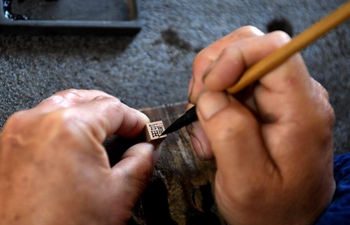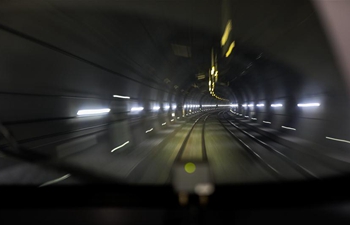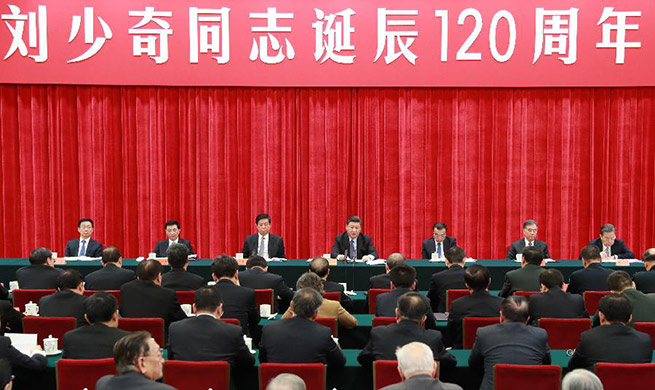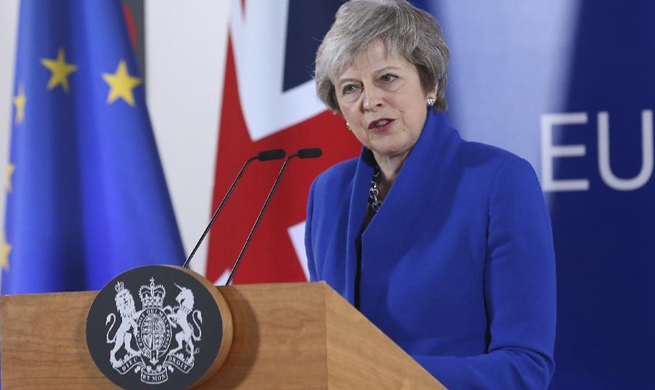LONDON, Nov. 25 (Xinhua) -- British Prime Minister Theresa May on Sunday warned her fellow members of parliament that they will be opening the door to "more division and uncertainty" if they vote down her Brexit deal in the UK Parliament.
EU APPROVES IT
The prime minister's warning came shortly after the 27 leaders of the European Union (EU) member states endorsed her Brexit withdrawal deal and a political declaration on the future relationship between the UK and EU amid increasingly bleak prospects for her deal passing the House of Commons next month.
After 20 months of negotiations, the 27 leaders gave a green light for the Brexit deal to go ahead after less than an hour's discussion at a historic summit in Brussels on Sunday.
They said the deal, which needs to be approved by the UK Parliament, paved the way for an "orderly withdrawal".
UK APPROVAL NOT GUARANTEED
The British Parliament is expected to vote on the deal in early December, but its approval is far from guaranteed.
The Labour Party, Liberal Democratic Party (LDP), Scottish National Party (SNP), Democratic Unionist Party (DUP) and many Conservatives members of parliament are reportedly set to vote against.
May has appealed to the public to get behind the agreement, saying that although it involved compromises it was a "good deal that unlocks a bright future for the UK."
Theresa May said the deal "delivered for the British people" and set the UK "on course for a prosperous future."
Addressing the public at a press conference in Brussels on Sunday, May said the upcoming vote in the Parliament on her Brexit deal "would be the most significant in the Commons for many years."
It allows the country to "move forward together into a brighter future," she said.
"It is a deal for a brighter future, which enables us to seize the opportunities that lie ahead," the prime minister said in a letter to the nation, which was published on Sunday. "Outside the EU, we will be able to sign new trade deals with other countries and open up new markets in the faster-growing economies around the world."
"With Brexit settled, we will be able to focus our energies on the many other important issues facing us here at home: keeping our economy strong, and making sure every community shares in prosperity; securing our NHS (National Health System) for the future, giving every child a great start in life, and building the homes that hold too many people back, and building a country for the future that truly work for everyone."
Despite the fact it is MPs, not voters, who hold her fate in their hands in the coming weeks, she said she wanted to "speak directly to the British people," and would be embarking on a campaign in the next few days, to sell the deal to the public.
The outlines of that campaign were clear as she described the merits of the deal on Sunday, highlighting an end to free movement "once and for all," halting "vast annual payments" to the EU, and ending the jurisdiction of the European court of justice as the advantages of her deal.
She also stressed the British government's keenness to move on to domestic priorities -- a view she believes is shared by many voters.
"The British people don't want to spend any more time arguing about Brexit," she said.
At present, a number of members of parliament from all sides have criticized the Brexit agreement.
British Foreign Secretary Jeremy Hunt said on Sunday that the parliamentary arithmetic is "challenging." He refused to rule out the risk that the government could collapse if parliament rejected it.
British cabinet ministers and European Union diplomats are secretly drawing up "Plan B" proposals for Brexit based on a growing assumption that May's deal will be blocked by the parliament, British media reported on Sunday.
Senior figures on both sides of the British Channel are urgently plotting alternatives to the UK-EU agreement after 91 Conservative members of parliament indicated that they would oppose it in the vote.
However, a senior EU official denied that there's a "Plan B" on Sunday, saying the only "Plan B" was preparing a possible no-deal scenario.
Despite backing from EU leaders, opposition from British members of parliament showed no signs of letting up with Jeremy Corbyn's Labour and Arlene Foster's DUP vowing to vote down the deal in its current form.
Commenting on the deal, shadow justice secretary Richard Burgon said "Theresa May needs to wake up and smell the coffee, ditch this deal and come back with something better."
With this in mind, Labour's policy is to reject the deal and call for a general election, he said.
Questioned on BBC's Andrew Marr Show about the prospect of an election being unlikely, Burgon said, "I think the age of the experts is over."
"The age of political certainty is over," he added.













